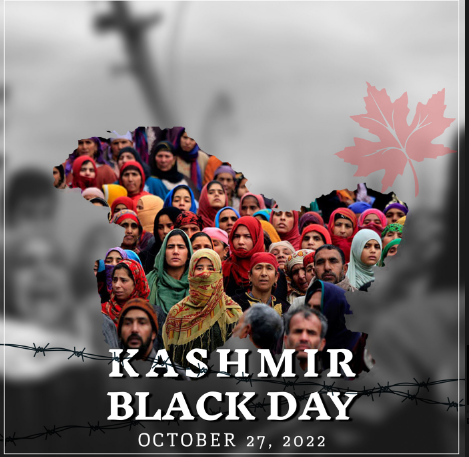October 27: Reminder of broken promises and unyielding resilience
 Mohammad Umar Bhat
Mohammad Umar Bhat
October 27 stands as a day of deep significance for the people of Kashmir, observed as Black Day, commemorating the arrival of Indian forces in Jammu and Kashmir in 1947. This historic moment marks the beginning of a protracted conflict and serves as a painful reminder of unfulfilled promises and a resilient struggle for self-determination. As one of the longest-standing conflicts in modern history, Kashmir’s plight continues to shape regional and international discourse, highlighting the urgent need for accountability and justice for a people long denied their fundamental rights.
The partition of British India in 1947 was a turbulent event that brought about immense change, granting the princely states, including Jammu and Kashmir, the option to join either India or Pakistan. Maharaja Hari Singh, the Hindu ruler of a Muslim-majority region, signed the Instrument of Accession with India under duress and without consulting the Kashmiri populace. India pledged that the future of Kashmir would ultimately be decided by the people through a plebiscite. This promise, codified in several United Nations Security Council (UNSC) resolutions, remains unfulfilled, leaving the Kashmiri people in a state of suspended autonomy and denied self-determination.
Over seven decades later, Kashmir’s Black Day continues to symbolize a deep-rooted disillusionment among Kashmiris, whose aspirations remain unmet. India’s military presence in the region only intensified in the years following 1947, consolidating its control over the region and diminishing any semblance of autonomy. The revocation of Article 370 in August 2019 marked a profound shift, stripping Jammu and Kashmir of its special status and placing the region under direct federal rule. To Kashmiris, this move was emblematic of India’s disregard for both their autonomy and international legal commitments, further compounding the sense of betrayal and frustration.
The denial of promised rights has resulted in widespread human rights abuses, with harrowing incidents emblematic of the region’s suffering. The 1990s saw the brutal suppression of resistance, with thousands of troops deployed to enforce India’s control. The period is marked by incidents such as the KunanPoshpora incident of 1991, in which Indian paramilitary forces reportedly raped over 100 women during a single search operation. Just two years later, in April 1993, Indian Border Security Forces set Srinagar’s commercial hub ablaze, resulting in the deaths of over 125 civilians in the LalChowk massacre. The Bijbehara massacre of October 22, 1993, in which 51 unarmed protesters were killed by Indian forces, is a reminder of the high human cost paid by the Kashmiri people.
These incidents, along with many others, underscore the broader suffering endured by Kashmiris and amplify the urgent call for justice. For Kashmiris, each of these painful memories remains deeply etched into the collective consciousness of a community that has resisted occupation with determination, even in the face of violent repression.
Yet, the Kashmir conflict is not only about territorial disputes or political maneuvering; it is fundamentally about human rights. The Kashmiri people’s struggle is a demand for autonomy, justice, and peace. The international community, particularly the United Nations, has a pivotal role to play in this regard. Despite a legacy of UNSC resolutions advocating for a plebiscite, the promises made to the people of Kashmir remain hollow. The international community’s inaction has only emboldened those who seek to legitimize an occupation, creating an environment where human rights abuses persist unchecked.
The long-standing conflict between India and Pakistan over Kashmir has not only impacted the lives of Kashmiris but has also destabilized South Asia. The lack of a resolution to the Kashmir issue has periodically heightened tensions between two nuclear-armed neighbors, underscoring the critical need for peaceful negotiations. A resolution, however, must center the aspirations of the Kashmiri people rather than being dictated by external powers, whose vested interests often overshadow the core issue: the right to self-determination.
Every October 27, as Kashmiris mark Black Day, their voices echo through the international sphere, calling for recognition and intervention. They remember the beginning of their oppression but also celebrate their enduring resilience. Kashmiris’ ongoing struggle is a testament to their unbroken will, with generations of people persisting in their demand for justice. It is a day that implores the world to acknowledge their plight, to address the grievances that have only compounded over time, and to take meaningful steps towards fulfilling the promises that were made over seven decades ago.
The commemoration of October 27 as Black Day should prompt global actors to reflect on their role in addressing injustices that continue to destabilize not only Kashmir but also the wider region. The principles of democracy and human rights, which are so frequently championed in other contexts, should not be selectively applied. The Kashmiri people’s demands are neither unreasonable nor unprecedented; they seek only what was promised to them—self-determination and the right to decide their future.
As the world observes Kashmir Black Day, it is vital to remember that the resolution of this conflict is not merely a political obligation but a moral imperative. The Kashmiri people deserve to live free from fear and oppression, with the autonomy to determine their destiny. Until their rights are acknowledged and their voices heard, peace will remain elusive in the region. October 27 will continue to serve as a somber reminder of broken promises and the enduring quest for freedom, justice, and self-determination in Kashmir.








